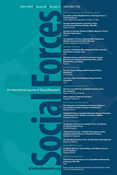-
Views
-
Cite
Cite
Cornel Ban, Capital, Coercion, and Postcommunist States By Gerald M. Easter Cornell University Press. 2012. 248 pages. $75 hardcover, $26.95 paper, Social Forces, Volume 94, Issue 3, March 2016, Page e70, https://doi.org/10.1093/sf/sou031
Close - Share Icon Share
Extract
How did the postcommunist state's capacity to tax emerge, and how was it used and abused? Taking Poland and Russia as his case studies, Gerald M. Easter uses fiscal sociology to provide sophisticated and compelling answers to these important and difficult questions.
Postcommunism was a political context in which both economic and coercive resources flowed from state to society, rather than the other way around. Also, under postcommunism the state is rich in both capital and coercive resources, the opposite of the situation studied by the literature on the state. But this flow did not have the same result everywhere. The best outcome was the “contractual state,” whereby state and society crafted a social contract in which tax collection would be to a great extent reliant on voluntary compliance while strong legal mechanisms would set limits to both bureaucratic coercion and tax evasion. This fortunate scenario dominated the stage in Poland and is credited to early societal checks on state coercion, social consensus around tax issues, and the erection of boundaries between social and economic power. As a result, the state did not have to use coercion as the main mechanism for extracting revenue, but when it had to use it did so on a regular and predictable basis. In contrast, Russia's transition resulted in a “predatory state” following the reassertion of authoritarian leadership, state–society relations dominated by the exercise of state coercion, and fuzzy frontiers between political and economic elites. Although the Russian state firewalled its use of bureaucratic coercion, it failed to use it on a regular or predictable basis, leaving predatory behavior as the default state practice.



